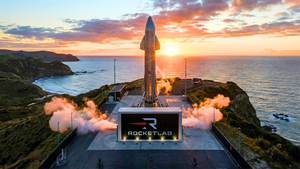Planet Labs PBC (NYSE: PL), a leading provider of daily data and insights about Earth, today shared that Justdiggit, a Dutch non-profit organization dedicated to supporting land restoration in sub-Saharan Africa, is leveraging Planet’s high-resolution SkySat satellite tasking capabilities, their near-daily PlanetScope satellite imagery, and the Planetary Variables data feeds to quantify, evaluate, and scale their regreening projects. By leveraging this cutting-edge technology, these two organizations are lending scientific credibility and concrete metrics to nature-based solutions.
Planet offers unique remotely-sensed insights and satellite tasking capabilities through their subscription-based satellite data platform, enabling customers like Justdiggit to gain an advanced awareness of the changing world we live in. Aptly named, Justdiggit supports local farmers and pastoralists in Tanzania and Kenya to use accessible tools, like shovels, to dig bunds—semi-circular shaped pits that help the soil capture rainwater. In regions impacted by drought and loss of natural vegetation, the top layer of soil can harden and act as a seal, but by digging through the dry layer, rain water can trickle down and hydrate the parched land. This ancient regenerative practice cools down the temperature of the region by allowing native grasses and trees to grow back, and this landscape change can be captured by Planet’s satellite imagery. Justdiggit uses mobile technology, data, and communication to scale up their impact on the African continent and to create awareness around nature-based solutions world-wide.
"Building the futures that we want will require us to live not only sustainably, but restoratively,” said Andrew Zolli, Chief Impact Officer at Planet. “The surest path to doing so is to support culturally relevant and ecologically proven practices with new tools, and that’s exactly what’s happening here. We couldn’t be prouder to see our data, products and services used in this way."
With 300,000 hectares under regreening, Justdiggit and their partners have already brought back over 10 million trees in sub-Saharan Africa. Over the last year, Planet, the European Space Agency (ESA), the University of Leicester, and Justdiggit launched the Restore-IT project, focused on evaluating and quantifying the success of their regreening initiatives. In this project, Justdiggit leveraged Planet’s PlanetScope and Planetary Variables products to measure the impact of their restoration sites in Tanzania and Kenya.
Through PlanetScope’s imagery scan, captured at 3 meter resolution, Justdiggit received high temporal resolution data of their sites, helping to evaluate discrete change over time. The Planetary Variables metrics quantified soil water content and land surface temperature, enabling Justdiggit to evaluate how many liters of water were retained by the soil, how many degrees the surface cooled down, and how much vegetation increased since the bunds were dug. Beyond this project, Justdiggit is also tasking Planet’s high-resolution SkySat satellites, allowing Justdiggit to view the scale of their regreening efforts overtime, visualizing the landscape change at 50 cm resolution.
“The key is in showing the impact long term and at the landscape level,” said Sander de Haas, Chief Technical Officer and Regreening Expert at Justdiggit, explaining that Planet data was used throughout the restoration process — from planning to evaluation — and provided valuable data for reporting comprehensive metrics to donors and partners.
“I focus on site selection, trying to identify from a remote sensing analysis which sites are suitable for our types of interventions. By having access to SkySat data, we are able to task imagery of the site. If indeed, this is an interesting site, we then send out a team to check on the situation on the ground, take samples, and talk to the community,” continued de Haas. After building long-term relationships and partnerships in the region, Justdiggit spearheads landscape restoration efforts and community education.
On the ground, pastoralists live with their livestock while wildlife, like zebras and gazelles, graze on the newly sprouting grasses from the bunds. Planet’s SkySat imagery captures the scale of the landscape regreening over months, while their Planetary Variables datasets help evaluate where regions are having success - lending scientific insights for the improvement of future projects.
“While the impact of our projects is obvious if you walk through the tall grasses in an area which was barren before, it is hard to capture that impact into quantifiable impact metrics that people can relate to. Using Planetary Variables, we are able to do exactly that: show the impact of our projects in tangible numbers such as ‘liters of water retained’, ‘degrees cooling’ and changes in biomass. This adds another dimension to our impact monitoring.”
With this information, Justdiggit is able to further scale this restoration work through a grassroots movement. As one farming community is able to see the impact of their work, they then become leaders and teachers for the next community, spreading educational roots through the region and growing new programs. “Thanks to the generated income through regreening, I can now bring my kids to school,” said Mpachacha Isayta, a pastoralist living in Kuku, Kenya working with Justdiggit.
These datasets and satellite images show the tangible progress that these initiatives are having on the landscape of Kenya and Tanzania, and this is just the beginning. As Justdiggit aims to scale their program to millions of farmers, they and their partners are making significant strides to regreen Africa, support sustainable livelihoods, and combat the climate crisis. Working together, these organizations show that solutions do exist, and you can even see them changing the world from space.
About Planet
Planet is a leading provider of global, daily satellite imagery and geospatial solutions. Planet is driven by a mission to image the world every day, and make change visible, accessible and actionable. Founded in 2010 by three NASA scientists, Planet designs, builds, and operates the largest Earth observation fleet of imaging satellites, capturing over 30 TB of data per day. Planet provides mission-critical data, advanced insights, and software solutions to over 800 customers, comprising the world’s leading agriculture, forestry, intelligence, education and finance companies and government agencies, enabling users to simply and effectively derive unique value from satellite imagery. Planet is a public benefit corporation trading on the New York Stock Exchange as PL. To learn more visit www.planet.com and follow us on Twitter.
View source version on businesswire.com: https://www.businesswire.com/news/home/20221110005807/en/
Contacts
Planet Press
Claire Bentley Dale
comms@planet.com
Planet Investor Relations
Chris Genualdi, Cleo Palmer-Poroner
ir@planet.com





